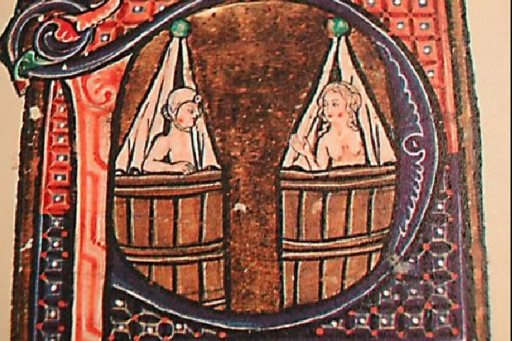Also, many peasants didn’t even use bath houses they bathed in their home with more effort by heating up basins of water.
But excessive bathing wasn’t really talking about bathing but going to public bath houses to meet and to … other people.
If you read the article/post, it goes on to say that in later centuries, some medical professionals misinformed the public telling them not to bathe with warm water because the ‘pores would open and let too much bacteria etc in.’ I am thankful they eventually reconsidered.
What a great blog series, thanks for the link!
Honestly, it came up on a StumbleUpon alternative I was using.
You care sharing said alternative?
Cloudhiker.net . It works almost the same way. For a free account you can save favorites but you don’t get history saved. So, if you want that histor, you just click on the website at the bottom to open the website outside the UI of cloudhiker which works right in any browser. And the web pages are just like Stumble Upon submissions. Fun, interesting quirky useful any topic. You check off categories just like Stumble Upon. BC quite frankly, the Mix app they replaced stumble Upon with succccckkks!
If you read the article/post
That’s a pretty big “if”.
Makes sense that Europeans inherited the Roman custom of bathing. There’s a brief mention that the Romans didn’t use soap. They did have soap, but most people thought water loosened the grime, and they scraped themselves with an implement called a “stringel” - which is where our word “astringent” comes from.
Strigil, but yeah. Honestly, I’m not sure why we don’t still use something similar commonly. I just looked it up, and there a few tools to perform the same task, but not many and it isn’t common. Sure, you can use a luffa or something for exfoliating, but they can breed bacteria and need to be replaced. A blade is reliable, functional, clean, and infinitely reusable. It seems like something that should be making a comeback, especially since most luffas are artificial and made of plastic.
Many misconceptions about the medieval period stem from the fact that the average person doesn’t even know when the medieval period was. To most laypeople, the entire span of time between the fall of Western Rome and the Industrial Era is considered “medieval.” This is an incredibly broad stretch of history that can actually be divided into two distinct eras. The latter of these eras—spanning from the late 15th to the early 19th centuries, depending on the region—is often referred to colloquially as the Renaissance, the Colonial Era, or the Enlightenment. Most historians, however, use the broad term “Early Modern Era.”
Interestingly, many misconceptions about the medieval period actually originate in the Early Modern Era. For example, the famously gruesome methods of torture and execution often associated with the medieval period largely belong to the Early Modern Era. In comparison, torture and execution in the medieval period were relatively simple and practical. Similarly, in relation to the article, it was the people of the Early Modern Era—not the medieval period—who had truly questionable hygene.
There are a few key reasons why hygiene declined in the post-medieval world. The main factor was the rapid growth of urban centers, which led to nearby waterways becoming polluted with human waste. With clean water harder to obtain, people bathed less frequently. The introduction of sugar from the New World into the European diet also wreaked havoc on oral hygiene, and it took centuries for proper dental practices to develop. Finally, as the article points out, there were many widespread misconceptions about hygiene and its role in preventing disease, particularly with regard to the much-feared Black Death.
In short, William the Conqueror was likely a well-groomed man, while George Washington probably stank.
And largely due to the US public education system lol. A lot of things they said in school were untrue or misconstrued. If they taught us true and interesting stuff like this, there would probably be less of a dropout rate.
A lot of the myths about medieval people were fabricated during the enlightenment and industrial eras to pump up the idea that modern people were so much better than ye olde boorish savages. Much of it is complete BS. People weren’t nearly as backwards and primitive as we’ve been led to believe.
They were hella superstitious, though.






